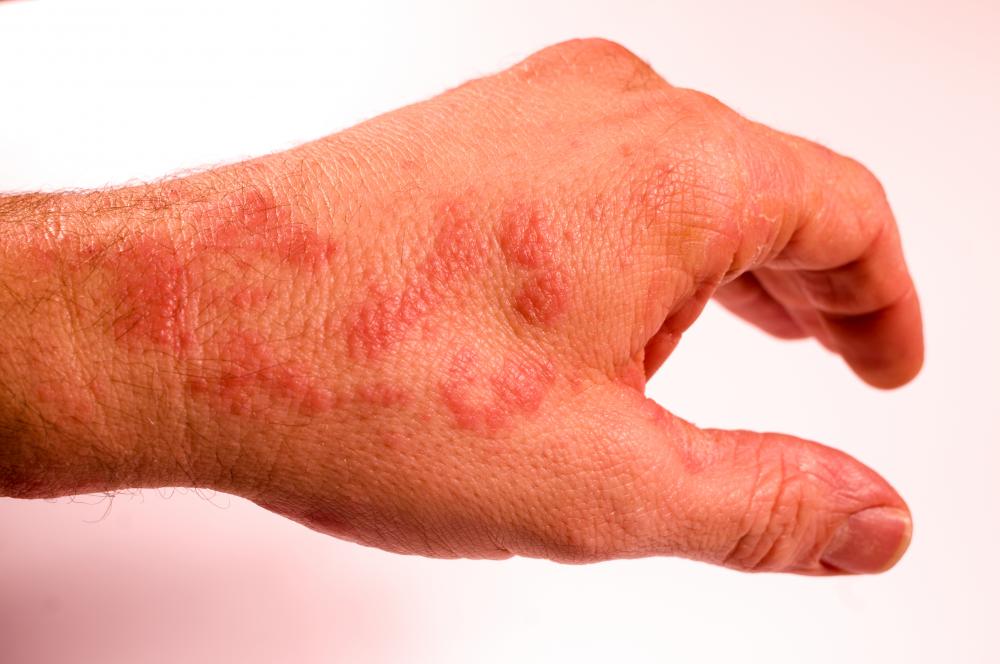At TheHealthBoard, we're committed to delivering accurate, trustworthy information. Our expert-authored content is rigorously fact-checked and sourced from credible authorities. Discover how we uphold the highest standards in providing you with reliable knowledge.
What is a Dermatologist?
A dermatologist is a medical professional whose training is related specifically to the skin, and this person spends the majority of his or her time studying and treating skin ailments. Much of the work is topical, treating rashes and acne and the like, but this sort of professional also deals with things like cancerous skin moles and can be involved in cosmetic and reconstructive surgeries involving nearly any part of the body. Research and analysis can also be very important. There are many different specialties within the field, and in general this sort of work takes just as much training as any other medical discipline.
Primary Responsibilities

Dermatology as a field is focused almost exclusively on human skin. Skin is the immune system’s first line of defense, and problems that start here can often spread internally and can become life threatening. A dermatologist’s main job is to examine patients with an eye towards keeping this barrier as healthy and as strong as possible.
People are usually referred to these sorts of specialists from other more general healthcare professionals. Some patients present with immediate problems like skin rashes or sores that need attention right away. Others have a family history of something like skin cancer or extensive sun damage, and in these cases regular appointments for basic check-ups can go a long way towards preventing problems later on. Dermatologists also treat cosmetic disorders of the skin, including hair loss, scars, and the skin changes associated with the aging process. Some perform cosmetic work, such as Botox® and collagen injections, and may also carry out some basic surgeries like eyelid lifts and liposuction. Professionals usually have the ability to treat basic issues and make diagnoses in the office, and typically have prescribing power, too, which means that they can order medicated ointments and creams for patients who need them.
Specialties

There are a number of specialties within the field. A dermatopathologist, for instance, focuses his or her energy specifically on skin diseases that are infectious, degenerative, or related to the immune system. These professionals usually spend a lot of time studying specially prepared tissue sections, cell scrapings, and smears of skin lesions using a variety of microscope techniques, including light microscopy, electron microscopy, and fluorescence microscopy. He or she may not actually have much direct contact with the patient in person, but a lot of this depends on the setting.

Another sub-specialty, pediatric dermatology, focuses on skin diseases that are more common in children, including birthmarks and neonatal issues. These physicians often work as members of larger medical teams treating children with multiple conditions. Some professionals choose to work in hospitals, where they typically deal with trauma and serious diseases. Those who elect to work in private practice can limit their work to nuanced areas, like teen skin issues, moles and skin cancer, or cosmetic procedures and anti-aging.
Importance of Research and Lab Work

Not everyone with this job works directly with patients. Many of the most important advancements in the field are made by physicians in labs or research centers who run studies with trial participants, usually in order to better understand certain conditions or as a means of formulating more effective treatments. These sorts of doctors usually spend most of their time thinking, analyzing, and writing. Their achievements and discoveries are often published in medical journals or presented at dermatology conferences, and can help those who are working in practices and hospital settings provide better care. Discoveries and new techniques can also influence how pharmaceutical manufacturers approach drug creation and synthesis, which can lead to more effective medications.
Getting Started in the Profession

Becoming a dermatologist typically follows the same basic process that any doctor would undergo, regardless of specialty. Candidates typically have to finish an undergraduate university degree first, usually in the sciences, then must graduate from an approved medical school. Depending on location, medical school usually lasts anywhere from three to four years. From there, graduates must complete an internship and sometimes also a residency in dermatology, which often involves a series of specialized exams. Many jurisdictions require doctors to renew their licenses on a regular basis, which can involve re-testing and periodic examination of skills.
AS FEATURED ON:
AS FEATURED ON:



















Discuss this Article
Post your comments